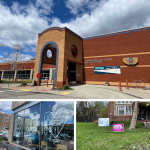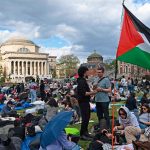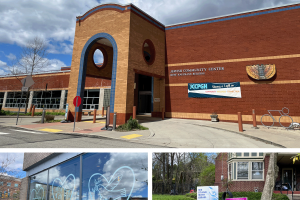
The doctor strides through Greenwich Village at rush hour on a December afternoon as if leaning into the wind. He is tall, lean, young—34—with longish wavy dark hair, charcoal eyebrows, a Roman nose. Carrying a raincoat and backpack, he appears vigilant. If violence were to erupt, he would be more likely to sprint towards a car crash or gunshots than away, in order to render first aid. Deferential and polite, a fellow who cherished and was cherished by his mother, who led the funeral prayers at her town mosque and hated to place great distance between himself and her final resting place by leaving Syria for America. Salim (a family name he is using to protect his privacy) refrains from bringing up his personal history unless asked.
Few Americans ask.
If someone does ask, he gives them time to reconsider and wander off, perhaps under the pretense of seeking a coffee refill. He understands that, for most Americans, the complexity and the preposterous cruelty of the narrative will feel overwhelming.
While a medical student, Salim served as a paramedic treating commonplace cases like heat stroke and ankle sprains until, in 2011, the country exploded with demonstrations and state repression. In time, he made it to the US and began a public health graduate program. Now a doctoral candidate, he focuses on health systems and population health in conflict and post-conflict settings.
On this early evening in mid-December, Salim has accepted an invitation to a small holiday party on a tree-lined street near Union Square. His host, Arien Mack, is the Alfred J. & Monette C. Marrow Professor of Psychology Emeritus at The New School, which is down the block and where she has taught since 1970. Barely five feet tall, she’s described by many as “formidable” and for the last half-century has had an up-close view of the tribulations and griefs of imperiled intellectuals. She has invited Salim and a dozen other endangered scholars to her home this evening in her capacity as founding director of the New University in Exile Consortium. It’s to be their first in-person gathering since the onset of Covid. Mack launched the Consortium in 2018 as an in-person and virtual meeting place for members of the intelligentsia peeling away from repressive countries. All her guests tonight fled their homelands to avoid imprisonment, assassination, or (in Salim’s case) orders to join the perpetrators.
In the four years since its launch with fewer than a dozen member institutions, the Consortium has expanded to 60 colleges and universities in North America, Western Europe, the UK, the Middle East, and Sub-Saharan Africa–including 29 in the US—all committed to hosting endangered scholars and enabling them to participate in the online weekly seminars. Over 100 lawyers, doctors, artists, and academics have come from 22 countries, including Afghanistan, Algeria, Azerbaijan, Brazil, Cambodia, Cameroon, China, the Democratic Republic of the Congo, Ethiopia, India, Iran, Iraq, Libya, Nigeria, Pakistan, Palestine, Poland, Syria, Turkey, Ukraine, Venezuela, and Yemen. Though Mack conceived of the program to sustain scholars in exile rather than literally rescue them, that role has changed since the fall of Afghanistan.
The scholars log in from all over the world for the weekly meeting. New members introduce themselves; then someone lectures on an academic topic—often, but not always, related to world events. For these talented, credentialed, and displaced people, the Consortium makes it possible to keep their professional selves alive. They are scholars of literature and architecture, archaeology and political science, linguistics and philosophy, film studies and urban studies, indigenous people’s history and Kurdish history, law and medicine, and other disciplines.
They all share expertise in another specialty, as well: how to not lose yourself under the pressure of dictatorship, how to draw a personal red line against the amplifying demands of a tyrannical government. Every Consortium member faced a critical choice back home: try to cling to their accustomed way of life or contend with the momentous consequences of resisting a system of oppression. All chose resistance; all lost their countries.
Now they try to cobble together new lives in the lands offering them sanctuary, without knowing whether to plan for a couple of years or for decades. Everyone longs to go home, where they have left behind loved ones, colleagues, and political allies, but the current regimes know their names and faces. Many have struggled with immigration paperwork, unsure when their visas will expire. For most, that depends on their work situation, but few have job security.
Heartsickness and despair are regular companions—and for that, the Consortium offers solace. Before and after the weekly lectures, and by email in between, they share personal updates: good news like a job offer, a publication, or the birth of a child or grandchild; or bleak news, as in February 2020 when Consortium member Gubad İbadoghlu, PhD, from Azerbaijan, currently teaching at the London School of Economics, shared a video of his daughter being brutally attacked as she reported fraud at an election polling station in Azerbaijan. “You can see how it happen,” he wrote. And he added a kind of a trigger warning: “Who has heart problem, please don’t watch it.”
From all over the world, scholars reacted with pain and grief. “Given how brave she clearly is, I am sure this will only further strengthen her will,” wrote Saladdin Ahmed, PhD, a visiting professor of political science at Union College, originally from the Kurdish Autonomous Region in Iraq. “There is nothing that scares the likes of [President Ilham] Aliyev more than the free human being who refuses to compromise…Sooner or later, Aliyev will join the rest of the totalitarian leaders, who despite their desperate attempts to secure some sort of immortality are, as Arendt says, forgotten with a ‘startling swiftness.’”
These days, as they watch the American right flirt with fascism, many wonder What are these Americans thinking? They’re certain that citizens attracted to right-wing nationalism over liberal democracy—in the US, Brazil, Hungary, Poland, Sweden, Turkey, Italy, wherever it’s happening—grossly misunderstand the nature of life under authoritarianism.
Mack’s guests this evening do not share that misunderstanding.
When Salim ducks out of the winter dusk into the fifth-floor wide-windowed carpeted apartment in a landmark building on West 12th Street, elegant appetizers and aperitifs await. Adorning the walls are Matisse lithographs, a Charles White painting, and other original works. Fresh flowers abound, and guests wearing oven mitts are careening with platters from the kitchen to the dining room table. Superintending the event is Arien Mack—a human rights crusader, tireless, snippy, and selectively empathetic, a Ruth Bader Ginsberg type in a wool skirt and sweater. The slightly left-of-center part from which her dark brown hair falls and cups her face has been her style for decades. If she’s asked for her birthdate, a bit more than ninety years ago, she laughs and dismisses the question: “That was a long time ago!”
In her living room, émigrés and New School faculty members sit in a circle of sofas, armchairs, and dining room chairs, balancing dishes of finger sandwiches, grapes, and soft cheeses. Salim, bobbing his head in greeting like a kid, fills a plate and finds a seat. He’s the youngest Consortium member here this evening and looks it, with his tousled hair and earnest manner. But he finds he has more in common with this shipwrecked group than with anyone else he’s met in America. The terrifying and brutal path he was forced down in his country had felt uniquely his own, or at least uniquely Syrian, until, taking in the experiences of these colleagues, it dawned on him that the struggles for democracy, freedom of expression, and justice took similar forms everywhere.
To the left of Salim in the circle is Teng Biao, 49, once one of the leading human rights lawyers in China and now one of the world’s leading Chinese dissidents. He sits very still, speaking only if addressed directly, evidently content to let everyone else talk first, and at length. Biao has been honored by governments and human rights organizations worldwide for his courage. He defended victims of torture, forced abortion, forced labor, contaminated vaccines, police brutality, and religious persecution. Over the years, as he ignored government orders to stop, the reprisals escalated from harassment to censorship to disbarment to beatings on the street to house arrest to kidnapping by the security police to torture. The authorities forbade him to speak at Hong Kong’s 25th-anniversary observation of the Tiananmen Square massacre in 2014, But he did anyway. “Our lives have the suffering of 1989 in them,” he told the crowd. “But as the Hongkongers have avowed: YOU CAN’T KILL US ALL!” The crowd roared its assent.
Later that night, unsure he’d be able to survive another period of imprisonment, he deferred to his supporters and escaped the country.
Binalakshmi “Bina” Nepram, 48, once one of India’s significant voices for indigenous rights and for gun control, is seated on the sofa, wearing a softly gleaming raw silk skirt and matching shawl. She comes from Manipur, a long-ago independent Asiatic kingdom like Nepal or Bhutan on the far side of the Himalayas; it has been under martial law since 1958. Bina co-founded the Control Arms Foundation of India and later the Manipur Women Gun Survivors Network, to offer support to the growing ranks of bereaved indigenous mothers, widows, sisters, and daughters, whose family members were killed by state or military occupiers. Like Biao, she persisted against escalating official warnings, specifically in her pursuit of justice for the family of a college student murdered in a road-rage incident by the son of a high government official. She didn’t relent until a deputized armed squad broke into her house in Manipur. She wasn’t at home and never returned. Instead, she fled to Delhi, learned the hit mob had followed her to the capital, accepted a one-way plane ticket to New York bought in haste by her friends, ran through the airport, and didn’t breathe easily until the cabin door closed.
Tonight, Bina is telling the group what happened next. “This is where my life took a different turn,” she says. “When I first arrived here, in May 2017, I had no family, I had no one.” Eventually, she was awarded an 18-month fellowship at Connecticut College. “I felt such peace there,” she says. “It was in the middle of nowhere. And it had this European feel, very quiet, pristine. And I fell in love with it, until I realized that—once the wine and cheese stopped—I was left alone. I was so alone. I felt so alone I took refuge in the library because I could hear students’ voices. There were three Indians teaching at the college, from my country. But they couldn’t place me; they were like, ‘How did you arrive here?’ My story negated their image of India. The whole year and a half I was there, they didn’t even invite me for a cup of tea. No one invited me for a meal. For us in India, anyone who comes—it could be anyone—we just say, ‘Come in. Have a cup of tea. Have a meal. Stay over.’ That hospitality is always there. So it was astonishing to me.”
When Connecticut College became one of Mack’s inaugural Consortium members, Bina was invited to participate. The Consortium saved her life, she says. “I feel I’m part of a global family now.”
“I, too, in China, was punished and marginalized,” Teng Biao notes. “And in the United States many Chinese people, they don’t want to contact me or they’re not too drawn to my activities. They intentionally keep back. Maybe a kind of self-censorship, maybe a kind of fear because they may return to China. They don’t want to be connected with me. And so: marginalized there, marginalized in the United States.”
Salim has felt this same alienation. “Sometimes I felt like I’m engaging with people, but it’s not engagement,” he says. “I’m being studied. I’m being learned about. I’m a field to explore, something very exotic. It’s very confusing; it adds more to the feeling of being lost. So here—this space—has become a refuge for me.”
“Thank you, Arien,” Bina says when she has finished her story. “We all thank you. You are an inspiration!”
“You’ve all made it worth it,” Mack replies. “I must say that, at this point in my life, I feel at least that I’m doing something worthwhile, and that’s a blessing.”
Of the thousand books marching across the shelves in Mack’s apartment are many by mid-twentieth century authors like Richard Wright, Saul Bellow, Hannah Arendt, Mary McCarthy, Michael Harrington, and—in translation from the Yiddish– Isaac Bashevis Singer, whom Irving Howe—the prominent democratic socialist, founding editor of Dissent, literary critic, and Mack’s ex-husband—first introduced to English-language readers. The world of these cultured, clashing intellectuals—opposed to Stalinism, despairing of capitalism, striving for social justice, was the setting for Mack’s young adulthood.
Mack, born in 1931, grew up in a Brooklyn Jewish family. Her father was a lawyer and her mother was a housewife and amateur sculptor. She earned a B.A. at Connecticut College, an M.A. from Brown, and a Ph.D. from Yeshiva. She married young and had two children, but then lost her husband. In 1966, the young widow joined The New School as an Assistant Professor of Psychology, and eventually married Irving Howe.
In 1970, Mack was named editor of The New School’s flagship journal, Social Research: An International Quarterly. She became chair of the Psychology Department, ran a research lab focusing on perception, cognition, and attention, and would publish more than 60 scholarly articles. In 1990, she founded the Journal Donation Project to give scholars in the former Soviet Union and other previously locked-down countries free access English-language research journals. Her growing acquaintance with endangered intellectuals inspired her to raise funds to sponsor one of them every year at The New School, beginning in 2006.
She wanted to do more. “If I’d been a research psychologist anywhere other than The New School, I don’t know if I’d have been watching the fate of endangered scholars around the world so closely,” she tells me.
But The New School had stepped up the last time educated people were fleeing for their lives in such numbers, and she—as a very young faculty member decades ago—had seen the tail end of it.
In the 1930s and ‘40s, across Nazi-occupied Europe, Jewish and “non-Aryan” lawyers, scientists, doctors, and professors were purged from their positions and ran for their lives. Most would be captured and swept east, to Poland, to the extermination camps. Many held out hope until the very end that an American university would offer employment, giving them a shot at the golden ticket, a “non-quota visa” from the US State Department, and the dream of a new life in New York, Boston, or Chicago. Despite the “myth of a welcoming American academy,” few American universities stepped up to employ even one of the desperate scholars. ‘We already have a Jew on campus,’ more than one college president implied. Thus only a remnant—944 individuals between 1933 and 1941, and perhaps another thousand before the end of the war—reached American shores. The barriers thrown up by immigration officials and the indifference with which most universities treated the 11th-hour appeals doomed nearly all of them.
The exception was The New School for Social Research, a small research institution founded in 1919, which, in time, would help 184 endangered European scholars reach safety. Keenly aware of the attack on Jewish academics in Germany, New School president Alvin Johnson convened an advisory board that included former Supreme Court justice Oliver Wendell Holmes Jr. and future Supreme Court justice Felix Frankfurter and began fundraising to provide salaried positions.
Johnson dubbed the 15 rescued scholars who remained at The New School “The University in Exile” and they became the foundation of a peerless graduate school. Anthropologist Claude Levi-Strauss, Gestalt psychologist Max Wertheimer, economists Karl Brandt and Gerhard Colm, and others would go on to have an outsize influence on American scholarship and culture. President Roosevelt’s administration, particularly the government’s intelligence agency, the Office of Strategic Services, turned to University in Exile faculty members as experts on the political and social conditions in Europe.
Their students won not only Nobel Prizes but Oscars and Tony Awards after exiled German stage director Erwin Piscator founded the Dramatic Workshop in 1940. His students included Tennessee Williams, Marlon Brando, Walter Matthau, Bea Arthur, Rod Steiger, Shelley Winters, Harry Belafonte, Elaine Stritch, Ben Gazzara, and Tony Curtis. Brando would later write of the extraordinary New School faculty and their peers around New York: “They were enriching the city’s intellectual life with an intensity that has probably never been equaled anywhere during a comparable period of time.”
The New School’s original University in Exile faculty members relied upon one another not just as professional colleagues, but as fellow survivors of debasing attacks, narrow escapes, and the murders of loved ones. They understood one another in ways indecipherable to most of their American hosts. The last of the great old intellectuals still trod the hallways, hectoring, arguing, gesticulating, waving marked-up typed pages, wiping their eyeglasses, coughing, and smoking when Mack joined the faculty. “They were older, European; I was an attractive young American woman; they liked me,” she would tell me in a later conversation. “They were imposing. None of them became intimate friends; I was decades younger. I had children; they were in their 70s and 80s. At faculty meetings, the accents were heavily German, often difficult to understand; one is of course very aware of where they came from and under what circumstances.” Later Austrian, Belgian, and French refugee scholars came as well. With a very small faculty at The New School, she describes their presence as “the background” of her life. “They were an in-house community, with all the tensions of a community. There were antagonisms, like family quarrels. They had each other.”
It was that group that inspired Mack to create the Consortium. In 2007, she founded Endangered Scholars Worldwide, a clearinghouse for monitoring threats against freedom of thought and expression. The censorship, harassment, incarceration, and murders of intellectuals, artists, academics, and students surged on her watch, outpacing anything one person or institution could possibly do to offset it.
Several international nonprofits helped threatened intellectuals reach safety and temporary teaching positions in democratic countries. Mack worked with them but knew that these life-saving missions—getting the scholars out of harm’s way and helping them secure a temporary livelihood—left a crucial piece unaddressed: helping the escapees survive exile. Once they stopped running, as Bina, Biao, Salim, and others observed, they faced annihilating loneliness. “What I realized after bringing over individual endangered scholars for about ten years was that they weren’t taken up by their host departments,” she tells me. “The chairs and faculty members meant well; they maybe saw somebody once, met what they saw as their obligation.”
The New School could not reasonably take more than one or two endangered scholars, but what if other universities signed on to host as well? “Once I had the concept, I started writing letters,” she tells me. “I wrote the presidents of universities on my own, asking if they would join me.” Half a dozen signed on immediately, starting with Columbia University.
Mack envisioned a community of brilliant survivors who had risked everything in the name of freedom of thought, freedom of expression, democracy, and human rights. She looked forward to the day when, as each of the scholars reached the safety of one of the Consortium schools, she could offer them a lifeline through the dark winter of exile she knew was coming for each of them.
Salim attended his first seminar in person in 2018, the Consortium’s first year. By then, after a few years in America, the young physician had formed the habit of concealing his background. When the seminar host that week warmly invited Salim to tell his story, he found it startling, and then cathartic.
“In New York, when a beggar comes to ask for a dollar, sometimes you shut your face away,” he began. “There, I could not shut my face away. It was something you could not escape; you realize your value system will be defined by how you respond to this.”
In March 2011, inspired by the Arab Spring, thousands of Syrians turned out for peaceful pro-democracy street demonstrations, he explained. Salim was preparing to apply to medical residencies abroad. His uncle was a practicing neurosurgeon in France and Salim hoped to follow in his footsteps, but the brutal government crackdown on the demonstrators meant that doctors were desperately needed in the streets.
The government response to the street demonstrations was so vicious, bloody, and indiscriminate that Salim briefly wondered if the Syrian president actually knew what was happening. Security forces and state-sponsored militia were beating people on their heads and in their faces, trying to cause real damage, then herding injured people into jails. Salim and his fellow paramedics and physicians struggled to pull battered protesters away from the security forces and get them into hospitals. But the security troops stormed into the hospitals, found the demonstrators, mauled them, and yanked them out. In the first month of the popular uprising, 277 civilians were killed and 1,437 others were arrested. In response, Salim and a few colleagues assembled an underground emergency care system. In allies’ back bedrooms or workshops, they set up secret operating theaters, sufficient to staunch an artery, remove shrapnel, and stabilize a patient.
One day, stepping outside after a visit to one of the makeshift ERs, Salim was arrested by plainclothes agents wielding AK-47s. They stuffed him into a waiting car and then locked him into a tiny, dank, dark, and windowless cell with about 25 other prisoners. He found it difficult to stand, to lie down, even to breathe. Later he was moved to a larger cell—maybe 20 by 30 feet—with 63 prisoners. Air was circulated by a small pump; when the electricity went off, people began suffocating. Occasionally Salim was pulled out and interrogated. “One interrogation technique is making you stand on one leg for most of the day, with both hands and one leg bound behind your back,” he told the group. “But this is light, you must understand. On the severity scale, this is just an introduction. This is the baseline. So you could let your imagination go.”
The guards mockingly called Salim “The Doctor.” When he was dragged back to the cell, he couldn’t use his hands. Other prisoners fed him. “I was sick,” he said. “I was physically disabled.”
After 115 days in prison, blindfolded hands cuffed behind him, he was dragged in front of a military court and charged with terrorism for providing healthcare to terrorists, among other charges. Then, against all expectations, he was released on bail. His friends held a party for him. On a sheet cake, they had replicated, in icing, a pair of manacled hands reaching for a butterfly. They handed Salim a cake knife and invited him to slice through the chain.
A week after his release, Salim returned to his medical residency. But then he received his draft notice. “That would be like it’s worse than suicide,” he said, “because I will be forced to do things that I don’t want to do.” He knew better than most that to join the Syrian military would be to consent to becoming a war criminal. “If this forced conscription law was not there, I probably wouldn’t have left Syria,” Salim says. “It wasn’t about getting better life or getting a better education. The core reason was just because I didn’t want to commit to anything after everything I did.” So he left the country. But once he arrived in the United States, a new kind of alienation set in. “At work and university, I hide my story,” he told the group. “I feel it becomes a point of disengagement, where I come under focus as an experience to be studied, not as a person to be engaged with and be a friend with.”
His university was a Consortium member, so Salim was invited to participate. The simple act of telling his story at his first meeting was a turning point. The group was moved by his suffering, and they understood it. He began to feel less alone.
Elaine Miller-Karas, a social worker and co-founder of the Trauma Resource Institute in Claremont, California, tells me that this kind of storytelling can be healing. Her organization works with individuals and communities worldwide who have survived natural or human-made disasters, from the Rwandan genocide to the war in Ukraine.
“When you tell your story to others who understand it, you feel less alone,” she says. “In our work, we encourage people to go one step further and tell us not only about their trauma but about their survival. ‘When did you realize you would get out of that situation?’, we ask. ‘When did you know you survived?’ Some people tell us—even years after they achieved basic physical safety—‘Oh, I don’t know if I have survived.’ Then we ask: ‘What would have to happen for you to know that you survived?’ If there’s a place, even remotely, that you can come and be with other survivors, it’s powerful and diminishes the isolation.”
As Mack’s holiday party winds down, the guests seem reluctant to part.
“Look out for an invitation,” Salim calls as Bina prepares to leave. “Next week we’ll all go out to dinner.”
As guests clear off the dining room table and tidy her kitchen, Mack is nailing down New Year’s Eve plans. First people will come here, then maybe go out? Small groups linger just inside the front door, in the hall outside, and on the sidewalk outside the building. Many carry foil-wrapped leftovers urged upon them by their host.
Earlier in the evening, Salim had observed: “Being in prison and being in exile, in both places, there is that sense that you don’t exist. It’s not that you’re not important, it’s that you don’t exist. It’s like you are being kicked out of history.”
That sense of historical erasure, shared by many in the group, is a grave sign about the state of the world. Indeed, 2022 marks the 16th consecutive year of democracy in retreat, according to a recent report from Freedom House, a human rights watchdog, “shifting the international balance in favor of tyranny.” Democracies are shaken by illiberal forces within their borders. Authoritarian states support one another—Iran and Russia underwrite the Syrian government; Russia and China support Venezuela. President Trump was a fan of Brazil’s Jair Bolsonaro and of Hungary’s Viktor Orbán.
Salim sees the New University in Exile as an act of resistance against these terrifying trends. “The Consortium tells us to open up to each other and try to make something out of this time, to continue the work we were doing before,” he says. “I think the Consortium is actually helping us stay within history.”





